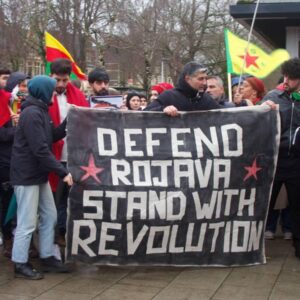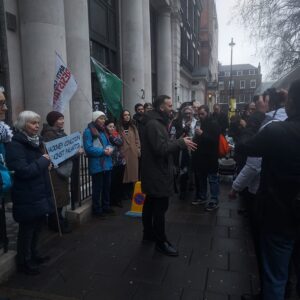Source >> Gilbert Achcar’s blog
On 29 April, the New Stateman published an interview that its Europe correspondent Ido Vock did with Noam Chomsky. Reading the interview – starting from its title itself – I got the impression that the interviewer might have wanted to seize an opportunity to achieve a little sensation by setting a trap for Chomsky. In what follows, I will comment on the most significant excerpts from the interview – reproduced below in italics – to show how the sensation was performed. My comment is inserted under each quote in non-italicized text. Fortunately, a video recording of the actual interview has been posted online. It is much better than the use the NS made of it.
Gilbert Achcar
*************
But first, let me begin with a general comment on Chomsky’s ethical stance, which causes so much irritation among those who stand on the receiving end of his criticism – be they the US establishment or its allies and fans – or those who perceive Chomsky’s remarks as belittling crimes perpetrated by anti-Western forces whereas his intent is rather to emphasize the magnitude of US crimes, an emphasis that he believes to be his duty as a US citizen.
This moral imperative has been best expressed in the Gospel of Matthew’s famous lines:
Why do you behold the mote that is in your brother’s eye, but do not consider the beam that is in your own eye? …You, hypocrite, first cast out the beam out of your own eye; and then shall you see clearly to cast out the mote out of your brother’s eye.
Having said this, I have no problem in acknowledging that, in the course of contextualizing non-Western states’ crimes, Chomsky has not always been tactful enough to make sure that his words do not offend these states’ victims. In that sense, the reproach of being US-centric or Western-centric that has often been made to him by people who belong to those victims’ side seems to me to be warranted. I can appreciate this all the more because I myself belong to the side of those victims. But this does not alter the basic righteousness of Chomsky’s critique of US policies.
Let me now comment on the interview, starting with its title.
Noam Chomsky: Russia is fighting more humanely than the US did in Iraq
The text of the interview clearly shows that this is not an assertion formulated by Chomsky himself but an opinion that the interviewer has literally put in his mouth. He addressed the question to Chomsky in that malicious way, as the video shows, and got him to agree, which Chomsky did by stressing that it is obvious. Chomsky’s intention was clearly to emphasize the viciousness of the US bombing of Iraq rather than to minimize the brutality of the Russian bombing of Ukraine. That the sentence got then turned into a title where it is presented as if it were a quote from Chomsky is plainly dishonest. On top of that, it does a disservice to the Ukrainian cause and renders a service to Russian Putinist propaganda for the sake of attracting attention by way of sensationalism.
Yet Chomsky’s worldview does not leave space for Ukrainian agency. It is the “US and Britain” who have “refused” peace negotiations in Ukraine, Chomsky tells me, in order to further their own national interests, even as the country is being “battered, devastated”. That negotiations with Russia would mean de facto abandoning millions of Ukrainians to the whims of an aggressor that has shown itself capable of extraordinary brutality, such as in Bucha and Izyum, is dismissed. “Ukraine is not a free actor; they’re dependent on what the US determines,” he says, adding that the US is supplying Kyiv with weapons simply to weaken Russia. “For the US, this is a bargain. For a fraction of the colossal military budget, the US is able to severely degrade the military forces of its only real military adversary.”
Three points here:
1. Chomsky actually makes clear his concern that the US has been blocking the path to a negotiated settlement while Ukraine is being “battered, devastated”. He was certainly not advocating the abandonment of the Ukrainians to a cruel fate.
2. The assertion by the interviewer that “negotiations with Russia would mean de facto abandoning millions of Ukrainians to the whims of an aggressor” is a non sequitur: negotiations do not in any way imply that the Ukrainians would abandon the fight or that NATO should cease supporting the fighters. The Vietnamese held negotiations with the US during five years while continuing to fight with Soviet and Chinese support. Chomsky’s statement in the actual videoed interview that it is “reasonable to provide weapons to Ukraine to defend itself against aggression” has not been reproduced in the written piece – one is entitled to infer that this was because it provided a corrective to the impression that the interviewer wanted to convey about Chomsky.
3. It is hardly disputable that for the US, Ukraine’s war against the Russian invasion is a “bargain”. In other words, Russia’s invasion of Ukraine has been a boon for the US: its effect on Russia’s actual military capability and “credibility” as well as on Europe’s allegiance to Washington is tremendous.
According to Chomsky, Russia is acting with restraint and moderation. He compares Russia’s way of fighting with the US’s during the 2003 invasion of Iraq, arguing that large-scale destruction of infrastructure seen in that conflict “hasn’t happened in Ukraine”. He adds: “Undoubtedly Russia could do it, presumably with conventional weapons. [Russia] could make Kyiv as unliveable as Baghdad was, could move in to attacking supply lines in western Ukraine.”
The fact that “Russia is acting with restraint” is again hardly disputable: it could obviously inflict much heavier damage on the whole of Ukraine’s population and infrastructure than it has done until now. This doesn’t mean though that Russia is restraining itself because it is “moderate”! It has been restraining itself most likely for fear of Ukrainian retaliations deep into Russian territory that would expose the reality of Vladimir Putin’s “special operation”. However, the phrase that “Russia is acting with restraint and moderation” is not a direct quote from Chomsky but another interpretation of his views by the interviewer.
Concerning Iraq, there’s some confusion about which of the two wars – 1991 or 2003 — was being discussed. In fact, the large-scale destruction of Iraq’s infrastructure occurred not in 2003 but during the earlier US-led war – a historic brutal bombing campaign that Jessica Mathews (who, a few years later, became President of Carnegie Endowment for International Peace and still is) very aptly summarized in the expression “Bomb Now, Kill Later”. A few days after the end of the bombing, the New York Times reported what follows:
A United Nations survey of civilian damage caused by the allied bombardment of Iraq calls the results “near apocalyptic.” The survey, which was made public today, recommends an immediate end to the embargo on imports of food and other essential supplies to prevent “imminent catastrophe.” The report, prepared by a United Nations team that visited the country between March 10 and March 17, says the bombing has relegated Iraq “to a pre-industrial age” and warns that the nation could face “epidemic and famine if massive life-supporting needs are not rapidly met.”
How many tens of thousands of Iraqis were directly killed by the 42-day bombing of their country in 1991, no one can tell with certainty. Likewise for the probably much higher number of casualties that resulted indirectly from the destruction of Iraq’s infrastructure in the above-described manner followed by twelve years of severe sanctions imposed on the country. (All this, leaving aside the large number of Southern Shia Iraqis who fell victims to Saddam Hussein’s murderous suppression of their 1991 uprising under the benevolent watch of US forces.) Whatever estimates one follows, they all stand way above the results for the similar number of days in the Russian war against Ukraine. That is because the aerial bombing of Iraq in 1991 was indeed one of the most intensive in history, with over 100,000 sorties and 88,500 tons of bombs!
When I asked him to clarify whether he was implying that Russia is fighting more humanely in Ukraine than the US did in Iraq, Chomsky replies, “I’m not implying it, it’s obvious.” Delegations of UN inspectors had to be withdrawn once the invasion of Iraq began, he says, “because the attack was so severe and extreme… That’s the US and British style of war.” Chomsky adds: “Take a look at casualties. All I know is the official numbers… the official UN numbers are about 8,000 civilian casualties [in Ukraine]. How many civilian casualties were there when the US and Britain attacked Iraq?”
The malice of asking if Russia is fighting “more humanely” in Ukraine than the US did in Iraq has already been commented upon above (it would have been certainly more appropriate to ask if Russia is fighting “less destructively” for instance). As for the number of Iraqi casualties directly caused by the 2003 US-led invasion of Iraq – about which the interviewer engages thereafter in a discussion of how they compare to the number of Ukrainian casualties caused by the ongoing Russian invasion of Ukraine – they were limited by the fact that Iraq in 2003 was in an advanced state of exhaustion, unable to fight against the mightiest military force on earth. Moreover, most of Iraq’s population had no incentive to fight on the side of a murderous regime for the sake of its survival. This is why the operational phase of the US-led invasion of Iraq lasted only 41 days and ended in the occupation of the whole country, whereas the Russian war on Ukraine has been ongoing for more than 430 days and counting, managing to seize only a portion of the country’s eastern provinces.
A final note in this regard: in the videoed interview, Chomsky also referred his interviewer to Israel’s 1982 invasion of Lebanon, pointing to the fact that about 20,000 people died because of it. This has been omitted in the written interview.
At times, Chomsky’s ideological priors lead him to overlook facts that might contradict his narrative. For instance, Sweden and Finland, which had been officially non-aligned for 210 and 73 years, respectively, both applied to join NATO in May 2022. To most observers, the end of their decades of neutrality might seem at least tangentially related to the invasion of Ukraine three months earlier. However, Chomsky says that both countries seeking to join NATO had “nothing to do with fear of a Russian attack, which has never been even conceived”. Claims that Russia could threaten either country amount to “Western propaganda”, he adds. Instead, Chomsky argues that joining NATO gives the military industries of both Nordic countries “great new market opportunities [and] new access to advanced equipment”.
In fact, both countries explicitly cited the invasion of Ukraine as the reason behind their applications to join NATO. Moreover, within living memory, Finland fought off Soviet attempts to conquer and annex the country. The Winter War of 1939-40 against the USSR still shape Finnish attitudes to Russia.
Chomsky tends at times to bend the stick too much in the opposite direction when seeking to redress distortion in mainstream discourse – that much is true. The assertion that Finland’s and Sweden’s decision to adhere to NATO had “nothing to do with fear of a Russian attack, which has never been even conceived” is exaggerated and untenable. The quote mixes in fact two different assertions: one is that the two countries’ bid to join NATO had “nothing to do with fear of a Russian attack” – which is obviously inaccurate; the second is that such an attack “has never been even conceived” – an assertion that only those who have access to Russia’s military plans can make.
Chomsky’s criticisms of US foreign policy are not limited to Ukraine. Just as Washington provoked Russia with Nato expansion it is also “provoking China openly” over Taiwan, he tells me. “The US is carrying out a programme… to encircle China with a ring of sentinel states armed with advanced precision weapons aimed at China,” an apparent reference to American defence cooperation with countries such as Japan, South Korea and Australia.
“What is the threat from China at this point?” Chomsky asks me. “The threat is coming from the US with, of course, Britain following. [The UK] is just a lackey at this point. It’s not an independent country anymore.” Though he acknowledges that China is “not a nice country” and is violating international law in the South China Sea, he says “the talk about [war over] Taiwan is coming from the West”. Beijing, which views Taiwan as its own territory, has not ruled out an invasion and regularly conducts military exercises which simulate a blockade of the self-governing island.
That the US is “provoking China openly” over Taiwan and several other issues is yet another indisputable fact. So is the fact that China is responding to these provocations – such as Nancy Pelosi’s visit to Taiwan or the Taiwanese President’s meeting with Kevin McCarthy on US soil – by intimidating military gesticulations around Taiwan. In the videoed interview, Chomsky does say that, in reacting to these provocations, China has carried out military maneuvers “demonstrating that it can invade Taiwan”. The written interview points to the same maneuvers as if it were disproving Chomsky’s claim.
Reflecting on our conversation, I came across a passage in an essay from Chomsky’s 1970 book At War with Asia. “As long as an American army of occupation remains in Vietnam, the war will continue,” he wrote. “Withdrawal of American troops must be a unilateral act, as the invasion of Vietnam by the American government was a unilateral act in the first place. Those who had been calling for ‘negotiations now’ were deluding themselves and others.” These words seem to me to be more applicable to the war in Ukraine than anything Noam Chomsky said during our conversation 53 years later.
Chomsky’s 1970 statement was obviously displaying the necessary intransigence of a US citizen outraged by his country’s murderous invasion of Vietnam, who was insisting that his country must stop its aggression and leave Vietnam immediately and unconditionally since it had no business and no right whatsoever to impose any conditions on the Vietnamese. Russian antiwar activists should be saying exactly the same today with regard to Ukraine.
But the fact is that the US did leave Vietnam in 1973 after protracted negotiations with the Vietnamese Communists, as mentioned above, and that the Vietnamese sought these negotiations in conformity with their motto “Fight, fight, negotiate, negotiate”. Ukraine’s president himself has repeatedly welcomed the prospect of negotiations provided they be based on the principles of the UN Charter. The antiwar movement should be calling for negotiations between Russia and Ukraine based – primarily – on the principle of the inadmissibility of the acquisition of territory by force. It should be calling for a ceasefire predicated on the withdrawal of Russian troops from the territories that they have invaded since last year.
Art Book Review Books Capitalism China Climate Emergency Conservative Government Conservative Party COVID-19 EcoSocialism Elections Europe Fascism Film Film Review France Gaza Imperialism Israel Italy Keir Starmer Labour Party Long Read Marxism Marxist Theory Palestine pandemic Protest Russia Solidarity Statement Trade Unionism Ukraine United States of America War
The Anti*Capitalist Resistance Editorial Board may not always agree with all of the content we repost but feel it is important to give left voices a platform and develop a space for comradely debate and disagreement.
Latest articles
- Gaza: when is a ceasefire not a ceasefire?In Gaza, the answer is, when it was “negotiated” corruptly and agreed in bad faith argues Roland Rance.
- We stand with RojavaYou probably haven’t heard about the stabbing of a young man at a demonstration in Salford on Wednesday 21 January. But then you probably haven’t heard about the demo. held at Media City on Salford Quays so it wouldn’t have been too difficult for a reporter to have covered it. But the silence from the BBC, notes Geoff Ryan, was hardly surprising. The demonstration was called to protest the silence of the BBC on the slaughter being carried out of the Kurds of Rojava in Syria by the Syrian army, by Turkish backed militias and supporters of Islamic State (ISIS).
- Stop Palentir looting NHSDave Kellaway reports from the Thursday 22nd protest at Palentir HQ against Labour giving them a massive NHS contract.
- Big tech as traffickersFrancisco Louçã analyses Big tech. Is it a new power of techno-feudal lords as Varoufakis argues or an oligarchy of data traffickers?
- Iran: Campism and the Erasure of TheocracyNew forms of campism are undermining internationalism. Simon Pearson discusses.






